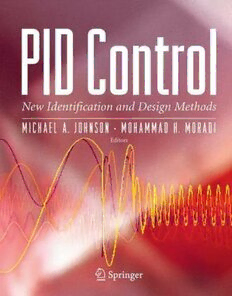Download PID Control: New Identification and Design Methods PDF Free - Full Version
Download PID Control: New Identification and Design Methods by Michael A. Johnson, Mohammad H. Moradi in PDF format completely FREE. No registration required, no payment needed. Get instant access to this valuable resource on PDFdrive.to!
About PID Control: New Identification and Design Methods
The effectiveness of proportional-integral-derivative (PID) controllers for a large class of process systems has ensured their continued and widespread use in industry. Similarly there has been a continued interest from academia in devising new ways of approaching the PID tuning problem. To the industrial engineer and many control academics this work has previously appeared fragmented but a key determinant of this literature is the type of process model information used in the PID tuning methods. PID Control presents a set of coordinated contributions illustrating methods, old and new, that cover the range of process model assumptions systematically. After a review of PID technology, these contributions begin with model-free methods, progress through non-parametric model methods (relay experiment and phase-locked-loop procedures), visit fuzzy-logic- and genetic-algorithm-based methods; introduce a novel subspace identification method before closing with an interesting set of parametric model techniques including a chapter on predictive PID controllers. Highlights of PID Control include: an introduction to PID control technology features and typical industrial implementations; chapter contributions ordered by the increasing quality of the model information used; novel PID control concepts for multivariable processes. PID Control will be useful to industry-based engineers wanting a better understanding of what is involved in the steps to a new generation of PID controller techniques. Academics wishing to have a broader perspective of PID control research and development will find useful pedagogical material and research ideas in this text.
Detailed Information
| Author: | Michael A. Johnson, Mohammad H. Moradi |
|---|---|
| Publication Year: | 2005 |
| ISBN: | 9781852337025 |
| Pages: | 558 |
| Language: | English |
| File Size: | 4.8 |
| Format: | |
| Price: | FREE |
Safe & Secure Download - No registration required
Why Choose PDFdrive for Your Free PID Control: New Identification and Design Methods Download?
- 100% Free: No hidden fees or subscriptions required for one book every day.
- No Registration: Immediate access is available without creating accounts for one book every day.
- Safe and Secure: Clean downloads without malware or viruses
- Multiple Formats: PDF, MOBI, Mpub,... optimized for all devices
- Educational Resource: Supporting knowledge sharing and learning
Frequently Asked Questions
Is it really free to download PID Control: New Identification and Design Methods PDF?
Yes, on https://PDFdrive.to you can download PID Control: New Identification and Design Methods by Michael A. Johnson, Mohammad H. Moradi completely free. We don't require any payment, subscription, or registration to access this PDF file. For 3 books every day.
How can I read PID Control: New Identification and Design Methods on my mobile device?
After downloading PID Control: New Identification and Design Methods PDF, you can open it with any PDF reader app on your phone or tablet. We recommend using Adobe Acrobat Reader, Apple Books, or Google Play Books for the best reading experience.
Is this the full version of PID Control: New Identification and Design Methods?
Yes, this is the complete PDF version of PID Control: New Identification and Design Methods by Michael A. Johnson, Mohammad H. Moradi. You will be able to read the entire content as in the printed version without missing any pages.
Is it legal to download PID Control: New Identification and Design Methods PDF for free?
https://PDFdrive.to provides links to free educational resources available online. We do not store any files on our servers. Please be aware of copyright laws in your country before downloading.
The materials shared are intended for research, educational, and personal use in accordance with fair use principles.

